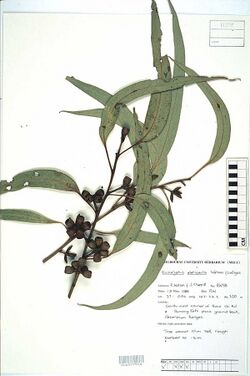Biology:Eucalyptus alaticaulis
| Grampians grey-gum | |
|---|---|

| |
| Herbarium specimen of E. alaticaulis | |
| Scientific classification | |
| Kingdom: | Plantae |
| Clade: | Tracheophytes |
| Clade: | Angiosperms |
| Clade: | Eudicots |
| Clade: | Rosids |
| Order: | Myrtales |
| Family: | Myrtaceae |
| Genus: | Eucalyptus |
| Species: | E. alaticaulis
|
| Binomial name | |
| Eucalyptus alaticaulis R.J.Watson & Ladiges[2]
| |
| Synonyms[2] | |
|
Eucalyptus cypellocarpa L.A.S.Johnson | |
Eucalyptus alaticaulis, commonly known as the Grampians grey-gum,[3] is a tree or mallee that is endemic to a restricted area in the Grampians National Park in Australia. It has rough, fibrous bark near the base of its trunk, lance-shaped leaves, groups of about seven cylindrical buds with a cone-shaped operculum, white flowers and more or less cylindrical fruit.
Description
Eucalyptus alaticaulis is a tree or mallee growing to a height of about 20 m (70 ft) with rough, grey, fibrous bark on the lower part of the trunk and main stems. The leaves on young plants are arranged in opposite pairs, broadly lance-shaped to egg-shaped, up to 140 mm (6 in) long, 90 mm (4 in) wide and glossy green but a lighter shade on the lower side. The adult leaves are lance-shaped, 120–300 mm (4.7–12 in) long and mostly 20–45 mm (0.8–2 in) wide and have a longer petiole than the juvenile leaves. They are the same colour on both surfaces. The flower buds are arranged in groups of seven on a flattened peduncle up to 24 mm (0.9 in) long, the individual buds on a short pedicel. The buds are more or less cylindrical with a conical operculum and the flowers are white. The fruit is cylindrical to oval, about 10 mm (0.4 in) long and 9 mm (0.4 in) wide.[4]
This species was previously included in E. cypellocarpa but is shorter, has persistent bark and broader juvenile leaves.[4]
Taxonomy
Eucalyptus alaticaulis was first formally described in 1987 by R.J.Watson and Pauline Y. Ladiges and the description was published in the journal Brunonia.[2] The specific epithet (alaticaulis) is derived from the Latin words alatus meaning "winged",[5]:858 and caulis meaning "stem" or "stalk".[5]:750
Distribution and habitat
The Grampians grey-gum is restricted to dry rocky slopes in the Grampian Ranges.[4]
References
- ↑ Fensham, R.; Collingwood, T.; Laffineur, B. (2019). "Eucalyptus alaticaulis". IUCN Red List of Threatened Species 2019: e.T133374696A133374698. doi:10.2305/IUCN.UK.2019-3.RLTS.T133374696A133374698.en. https://www.iucnredlist.org/species/133374696/133374698. Retrieved 20 September 2021.
- ↑ 2.0 2.1 2.2 "Eucalyptus alaticaulis". APNI. https://id.biodiversity.org.au/instance/apni/455202.
- ↑ "Occurrence record: Eucalyptus alaticaulis". Atlas of Living Australia. https://biocache.ala.org.au/occurrences/be38cbdb-961a-4b07-ba03-b7dfc3b4c948.
- ↑ 4.0 4.1 4.2 Messina, Andre. "Eucalyptus alaticaulis". Royal Botanic Gardens Victoria. https://vicflora.rbg.vic.gov.au/flora/taxon/67304361-0d92-458f-87fb-c9a9de127c74.
- ↑ 5.0 5.1 Brown, Roland Wilbur (1956). The Composition of Scientific Words. Washington, D.C.: Smithsonian Institution Press.
Wikidata ☰ Q15395846 entry
 |


